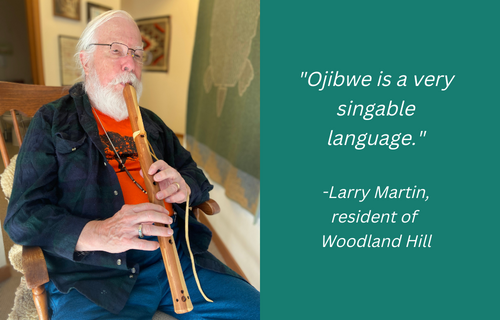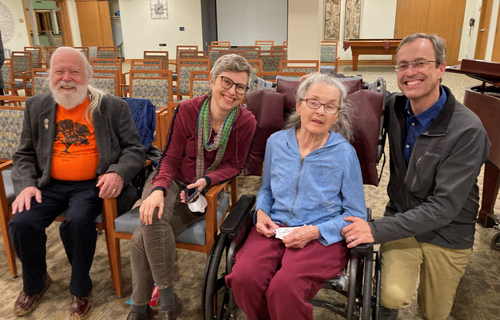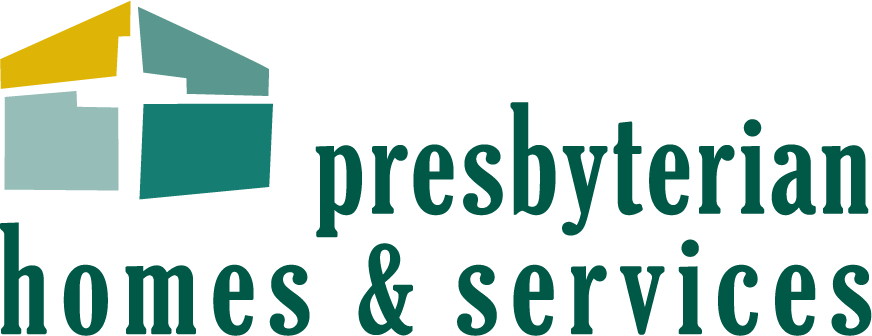 We’re proud of the cultural diversity at Presbyterian Homes & Services. In our series called My Traditions, we amplify the voices of employees and residents.
We’re proud of the cultural diversity at Presbyterian Homes & Services. In our series called My Traditions, we amplify the voices of employees and residents.
In honor of National Native American Heritage Month, today we share Larry Martin’s story. Larry and his wife Claire live at Woodland Hill, a senior living community in Hudson, Wis.
Larry, an enrolled tribal member in Lac Courte Oreilles, identifies strongly with his family’s Ojibwe heritage. Also known as the Chippewa, the Ojibwe people are “the most populous tribe in North America.”
Growing up a short distance from the Lac Courte Oreilles reservation in Wisconsin, Larry fondly remembers “maple syrup gathering, wild rice gathering, berry picking, hunting and fishing.”
A lifelong learner with a passion for his ancestors’ language
Yet, over the years, it was the Ojibwe language that really spoke to his heart — and intelligent mind. While his Ojibwe father didn’t fluently speak the language, Larry picked up words at home and from relatives living on the reservation. And with their encouragement, Larry’s grew curious about the language of his ancestors — now classified as endangered.
As young adult, Larry pursed an education at a Catholic seminary and explored teaching religion. Some years later — still unsure of his life’s vocation — Larry was spotted by a professor in continuing education. Recognizing Larry’s unique giftedness, he steered him in the direction of linguistics, the scientific study of languages.
Soon after achieving a doctorate degree, Larry embraced a unique direction in life: investing great energy and knowledge into revitalizing the Ojibwe language and culture.
Many years later, Larry’s focus remains unwavering. Several days a week, from a favorite chair in the sunny nook of his Woodland Hill apartment, Larry quietly employs his expertise.
Breathing new life into an endangered language

Breathing new life into the Ojibwe language, each week Larry and his friend Rick Gresczyk translate hymns and poems. Rick is fluent in Ojibwe, while Larry checks Rick’s work for accuracy.
Their focus in recent years has been to translate one hymn per week based on selected Psalms in the Catholic three-year liturgy cycle — and they’re nearing completion.
Setting the words to traditional English tunes requires unique attention to syllables, melody and rhythm. The challenge is dramatized by an Ojibwe grammar with words containing many syllables.
It keeps my mind active,” Larry says with a gleam in his eye.
Moreover, some words are more difficult to translate than others. “We have lots of words for creation [in Ojibwe],” Larry notes, “but when you come to a word like ‘salvation’, there aren’t any [Ojibwe] words that exactly mean that.”
Larry continues, “There’s a word that means to rescue somebody who is in danger of dying from, say, drowning or fire. But that’s really about taking them away from or out of a difficult situation. That’s sometimes used.”
Instead, another Ojibwe word lights up Larry’s imagination, based on the pioneering work of a missionary translator in the 19th century named Frederic Baraga. “I got this from Baraga — a word that means ‘to cause someone to live’ or ‘to give someone life’. That word is bimaadisi’.”
Worshiping God in Ojibwe
Come Sundays, at Gitchitwaa Kateri, an Ojibwe Catholic church in Saint Paul, Minn., Larry will pick up his indigenous flute to introduce a new hymn. “I usually play the melody once, and then everyone picks it up with the words,” he explains. “Ojibwe is a very singable language.”
Worshippers experience a beautiful, natural flow that engages their hearts. Together they encounter the One who gives them life — and whose praise inspires revitalization of the indigenous language.
And while most do not speak Ojibwe, Larry notes:
It still means a lot to them to sing [hymns] in the language. It’s about their identity.”
Find out how you or an older adult in your life can pursue purpose and make your mark at a PHS community in MN, IA or WI. Visit www.preshomes.org/living-and-care-options/find-a-community.
You might also be interested in:
Gitchitwaa Kateri parishioners reclaim Ojibwe language through hymn translation
‘My Traditions’ – Ukrainian egg decorating
‘My Traditions’ — Mother’s recipes inspire commissary kitchen director



